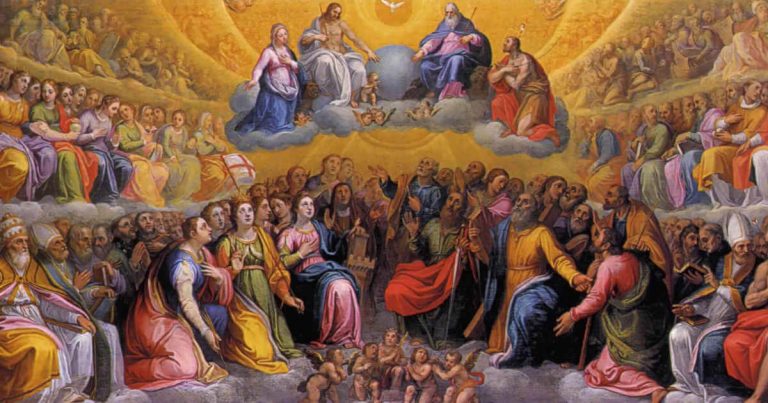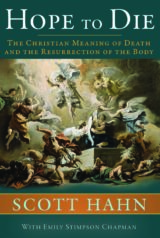By Regis Flaherty
Regis Flaherty is a bestselling author of several books, including Jesus Is the Gift: The Spirituality of Advent & Christmas, which is the fruit of over seven years of preparing others for Advent through talks on its liturgical themes.

Death is a birth into eternal life, but not everyone will have the same destination. There will be a day of reckoning, the particular judgment, for each and every person at the time of death. Those who are “found in Christ” will enjoy a heavenly existence. Yet there is another possibility, to which Saint Francis alludes in his poem-prayer: “Woe to those who die in mortal sin!”
The Catechism teaches, “Each man receives his eternal retribution in his immortal soul at the very moment of his death, in a particular judgment that refers his life to Christ: either entrance into the blessedness of heaven—through a purification or immediately,—or immediate and everlasting damnation” (CCC 1022).
Everlasting damnation will be the destination of some on their day of judgment. How many will experience that fate? We don’t know, but we do know that hell exists. Certainly the fallen angels are there, and Scripture tells us those who fail the test of love are also destined for hell. They “will go away into eternal punishment” (Matt 25:46). Certainly that thought should give us pause!
God’s grace is given to us; His door is open; His arm is extended. What is needful is our response. Heaven is denied those who die in the state of mortal sin. We cannot judge the fate of individuals—mercifully, that is reserved to God—but the Church teaches clearly:
“To choose deliberately—that is, both knowing it and willing it—something gravely contrary to the divine law and to the ultimate end of man is to commit a mortal sin. This destroys in us the charity without which eternal beatitude is impossible. Unrepented, it brings eternal death. (CCC 1874)
This “eternal death” is what Saint Francis calls “second death” in his Canticle of the Sun. The damned eternally are bereft of the relationship with God that He intended for them. Ultimately the options are simple. Heaven is to be with God. Hell is the total absence of God. Those who reject the Almighty freely choose all the horrors of hell.
This is a sobering thought; yet it should not lead us to debilitating fear. We must strive to fully live out the consequences of our baptism—a daily decision of our will—while knowing that ultimately we rely on the mercy of God.
You may have noticed that the quotation from the Catechism addressing entrance into the blessedness of heaven states that it may happen “through a purification or immediately” (CCC 1022). Some people when they die will be ready to go straight to heaven. As with those bound for hell, we have no indication of how many will take the direct route to glory. However, it is safe to say that many of us will need to undergo a further purification after death before we can stand before an all-holy God. This is because “every sin, even venial, entails an unhealthy attachment to creatures, which must be purified either here on earth, or after death in the state called Purgatory. This purification frees one from what is called the ‘temporal punishment’ of sin” (CCC 1472).
It is first of all important to note that purgatory is for those who have died in the state of grace. At death a person’s fate is sealed. He is either bound for heaven or hell. Purgatory is not an option for the damned. However, it is a merciful provision for those who require further purification prior to heavenly life.
Purgatory is not a place but rather a process. It has been explained in various ways. At times it has been referred to as fire that burns away the dross of our lives until only the pure “gold” of sanctity remains. Others liken it to a process where we let go of all that we have held so dearly on earth so that we can receive the great gift of heaven with open and empty hands.
Whatever the imagery we use, the reality is the same. Purgatory is a process of purification that ends in full admittance into the heavenly relationship with God.
You Might Also Like

In Hope to Die: The Christian Meaning of Death and the Resurrection of the Body, Scott Hahn explores the significance of death and burial from a Catholic perspective. The promise of the bodily resurrection brings into focus the need for the dignified care of our bodies at the hour of death. Unpacking both Scripture and Catholic teaching, Hope to Die reminds us that we are destined for glorification on the last day.